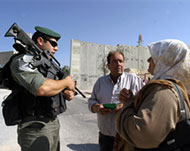Rights groups: Israeli barrier a land grab
Israeli human rights groups have accused the state of Israel of deliberately routing the West Bank barrier not to maximise security but to seize Palestinian land to expand and develop new Jewish settlements.

A new human-rights report accuses Israel of deliberately routing the separation barrier to expand and develop new Jewish settlements, highlighting the plight of Palestinian farmers.
Israel, however, says the structure severs to protect Jewish settlements.
The illegal barrier severs Palestinian territory and isolates communities across the West Bank, and has a devastating effect on Palestinian farmers, rights groups say.
With reference to the Palestinian village of Jayyus, Jessica Montell, executive director of an Israeli human-rights goup, B’Tselem said: “The expansion plans are what really make the route here devastating.”
“The situation in Jayyus is extremely dire,” she added.
The illegal eight-metre-high concrete barrier shadows Jayyus to the west, several kilometres deep within occupied West Bank, incorporating the small Jewish settlement of Zufim and large swathes of Palestinian land.
Palestinians have argued for years that the route of the barrier is a blatant land grab in line with Israel’s policy of extending settlements.
A report by B’Tselem and fellow rights group Bimkom says the extra land claimed by Israel’s illegal barrier is earmarked to build an industrial area and Nofei Zufim, a new Jewish settlement of 1200 housing units six times the size of Zufim.
Prosperity – a memory
If the illegal barrier had shadowed the contours of even Zufim, although the international community deems all Jewish settlements on Palestinian land illegal, then most Jayyus farmers would have unhindered access to their land.
Prosperity is a memory in the Palestinian village of Jayyus, which has seen most of its valuable fertile land amputated from farmers and suppliers by Israel‘s illegal separation barrier.
 |
|
Israel only allows Palestinian |
From his hilltop village, Abu Azzam can see his 175 dunums (43 acres) of avocados, mangoes, peaches, apples and apricots on the other side of the fence.
Three years ago, he employed more than 2000 workers. Today, only he and his wife have permits to tend the rotting farm.
“My 58-year-old wife has to do the work of a 28-year-old. Jayyus has lost 75% of its land, but 90% of its income,” he said.
Only those Palestinians who can prove ownership of the land, much of which has remained in families for centuries, qualify for access permits, according to Israeli law.
Deeper depression
Town merchants from Ram Allah and Hebron no longer buy Jayyus produce, forcing farmers to flog their goods for nothing on the local market, sinking deeper into economic depression.
Seventy to 80% of residents have their diet supplemented by food aid.
Young people, who require Israeli permission to leave, are leaving the village for elsewhere in the West Bank or abroad.
None of Abu Azzam’s children live at home.
In the distance, Israel‘s highrise coastal resorts shimmer in the haze, the promise of a different world.
In the bygone days when he made a good living, Abu Azzam educated all his seven children at university.
Today he finds it hard to make ends meet without handouts from his sons and brothers.
Israeli ‘land grab’
Israeli occupation froces open an access gate (military checkpoint) to Palestinian permit holders 12 hours a day, but Abu Azzam has been told it will soon close, forcing him on a 13km detour, on foot or donkey, since Israel has banned the use of cars in the area, to tend his land.
“I’m sure 70% of farmers will stop accessing their farms and it will be very easy for Israel to take the land,” he said.
|
“The expansion plans are what really make the route here devastating” |
Sarit Michaeli, a spokeswoman for Israeli rights group B’Tselem, said Israeli law specified that land “untended” for about three years reverts to “state land,” making future Palestinian access nearly impossible.
Although the Zufim case is before the supreme court, B’Tselem officials are wary about the chances of a high court ruling ordering planners to reconsider a similarly obstructive route around Alfe Menashe from materialising for years.
The illegal barrier – part electric fencing, barbed wire and enormous cement wall – surrounds 55 settlements including 12 in East Jerusalem which Israel illegally annexed, and will stretch around 700km when completed by the end of 2006.